| Srl | Item |
| 1 |
ID:
094532
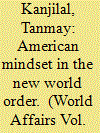

|
|
|
|
|
| Publication |
2010.
|
| Summary/Abstract |
A state can be defined as a moral person represented by its leadership whose culture and mindset it reflects. Given that the US has been a unipolar superpower in recent years and that it is rapidly declining in the face of several rising nations and regional blocs, it is important to understand its behaviour and predict its probable reactions in the future multipolar world. Contrary to the claims of its advocates, Tanmay Kanjilal notes that US preponderance has most often spread disorder and conflict internationally and is generating strong foreign and domestic reactions that set limits to the country's power.
|
|
|
|
|
|
|
|
|
|
|
|
|
|
|
|
| 2 |
ID:
094535
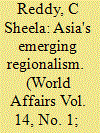

|
|
|
|
|
| Publication |
2010.
|
| Summary/Abstract |
The centre of gravity of the global economy has been shifting to Asia. The region's economic integration is an idea whose time has come and Asia could learn useful lessons from Europe. However, according to C Sheela Reddy it is likely to follow its own distinctive path and India could play a multifaceted role in this historic process. The diverse cultural, political and social context across the continent makes it difficult to "sell" the notion of supranational institutions to individual countries. Nonetheless, even as Asia accords priority to internal integration, it would remain strongly connected to the rest of the world.
|
|
|
|
|
|
|
|
|
|
|
|
|
|
|
|
| 3 |
ID:
094539


|
|
|
|
|
| Publication |
2010.
|
| Summary/Abstract |
India's liberal "pro-market" reforms began, rather hesitatingly under the government of Prime Minister Rajiv Gandhi in the mid-eighties and gathered momentum from 1991 under the leadership of his successor P V Narasimha Rao. Mitu Sengupta analyses the strategies of the World Bank and the International Monetary Fund in India and in a few other countries and shows that, after abandoning the principle of strict conditionality for the approval of loans and apparently distancing themselves from the US government, the IFIs applied subtler and more effective methods to recruit allies within the Indian political and administrative system in order to secure the adoption of the policies they required and engineer the liberalisation of the country's economy.
|
|
|
|
|
|
|
|
|
|
|
|
|
|
|
|
| 4 |
ID:
094538
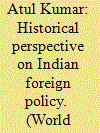

|
|
|
|
|
| Publication |
2010.
|
| Summary/Abstract |
Atul Kumar traces the evolution of Indian foreign policy from the arguably impractical idealism of its early post-colonial years towards an increasingly pragmatic realpolitik, founded on the perception of national imperatives as a predominant power in Asia. Faced with an unstable and unpredictable Pakistan backed by both China and the US, India is no longer bound by its ideological and military alliance with the defunct USSR and finds itself at the heart of a troubled and strife-prone region in which it has few if any reliable friends, in a climate of escalating global rivalry for power and resources.
|
|
|
|
|
|
|
|
|
|
|
|
|
|
|
|
| 5 |
ID:
094540


|
|
|
|
|
| Publication |
2010.
|
| Summary/Abstract |
India and Japan have a multi-secular spiritual, cultural and commercial relationship, which is becoming increasingly important to both nations in an era of global terrorism when they need each other's support. While their economies are in many ways complementary, strategic cooperation is growing rapidly between the world's second largest economy and the second largest country by population. Saroj Kumar Rath observes that New Delhi and Tokyo have also finally overcome misgivings related to their divergent geopolitical alignments and contrary positions on nuclear weapons.
|
|
|
|
|
|
|
|
|
|
|
|
|
|
|
|
| 6 |
ID:
094529
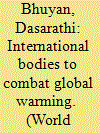

|
|
|
|
|
| Publication |
2010.
|
| Summary/Abstract |
Global warming, as a suspected aspect of ongoing climate change, is now a matter of paramount concern but governments have found it very difficult so far to agree on the ways and means to limit it and even on the diagnosis of the situation because of the fears that measures to reduce "greenhouse" gas emissions will have negative effects on the economy. Major developing nations reject mandatory limits on their emissions which they regard as attempts by the richer states to hobble their progress. Dasarathi Bhuyan argues that the very philosophy of limitless economic growth is deeply flawed as it does not take into account the finite amount of natural resources and the relative fragility of our planetary ecosystem, which most religions warn us about.
|
|
|
|
|
|
|
|
|
|
|
|
|
|
|
|
| 7 |
ID:
094541
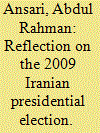

|
|
|
|
|
| Publication |
2010.
|
| Summary/Abstract |
The uproar created by the opposition, after the announcement of the results of the 2009 Iranian presidential elections, was another example of its unwillingness to tolerate violations of its interests. The opposition headed by Mir-Hossein Mousavi played with the sections of Iranian society hardest hit by the strong populist policies of President Mahmoud Ahmadinejad-the bazaar, the conservative clergy and the technocrats. Abdul Rahman Ansari concludes that Street events in Iran reflect the true character of the ruling elite-to go to any extent and even use the genuine concerns of the people, to protect its privileges.
|
|
|
|
|
|
|
|
|
|
|
|
|
|
|
|
| 8 |
ID:
094534
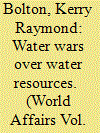

|
|
|
|
|
| Publication |
2010.
|
| Summary/Abstract |
This essay examines the possible scenarii for regional conflict over water resources, with emphasis on China the Asian region's superpower which, through its control of the Tibetan plateau, is likely to divert large amounts of water from major Asian rivers to meet its growing needs in a context of worrying scarcity. That policy is bound to cause conflicts with India, Indochinese states and even Russia, already alarmed by China's territorial claims. K.R. Bolton advocates the creation of an Asia-Pacific bloc, including India, Russia, ASEAN and Australia, independent of both China and the US, which are seen by the author as likely to remain objective allies or partners.
|
|
|
|
|
|
|
|
|
|
|
|
|
|
|
|